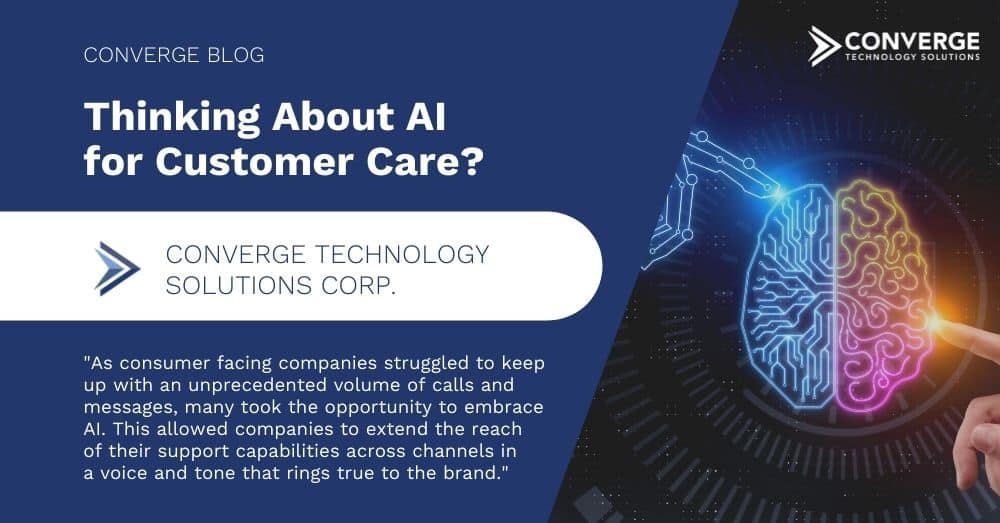There’s nothing artificial about an AI-powered customer experience.
Customer experience has become the ultimate competitive differentiator. Consumers expect brands they do business with to provide a high level of service and have become increasingly intolerant of anything less. This has prompted organizations across all industries to make significant investments in updating and upgrading the customer experience (CX).
The key is to ensure that the customer experience provided is on par with changing customer expectations. Introducing virtual assistants into the customer care queue is one way companies are adding speed and efficiency to their programs while lowering overall customer care costs.
“Modern businesses should view chatbots not as a replacement for humans but rather as supplementing the human workforce to help their employees be as efficient as possible. Notably, organizations must strike the important balance between self-service and human interaction to deliver the most convenient experience possible.”
–Sven Feurer, senior director of engineering and operations at SAP (via CMSWire)
In typical companies, only 25% of agent time is spent actually serving customers, while the other 75% is spent searching through vast amounts of content and resources to find an answer to the customer’s question. AI agents are trained to augment and amplify the efforts of their human counterparts by acting as the first line of defense. They can respond to, resolve, or escalate issues as needed by drawing from a knowledge base of coded conversational paths.
Breaking Point Leads to Breakthrough
Customer care is a shining example of a discipline forever changed by the pandemic. As consumer facing companies struggled to keep up with an unprecedented volume of calls and messages, many took the opportunity to embrace AI. This allowed companies to extend the reach of their support capabilities across channels in a voice and tone that rings true to the brand.
It’s easy for companies to miss the mark in knowing what their customers are actually looking for. They can make educated assumptions based on research, analytics, and experience—but the problem is that the data only takes them so far.
Understanding how your customers think and feel—beyond sweeping, persona-based drivers—is a tall order without analytics working in the background. Customer surveys like CSAT and NPS, which are widely accepted methods for measuring loyalty and satisfaction, cannot account for the nuances of sentiment that lead to identifying the root causes of objection, frustration, and churn.
Armed with those insights, companies can better train their support agents to relate and empathize with their customers, creating more seamless interactions and better experiences with the brand overall.
Once companies understand their customers on a cognitive and emotional level through a combination of AI and real-time data, they can begin to hyper-personalize marketing and communications efforts.
Industry Leaders in Customer Care
We are proud to partner with IBM, which was named #1 in Bot Platforms according to review site G2 Crowd. The Watson suite of tools has been built on an open, hybrid cloud platform making it a flexible and scalable solution for our customers.
According to IBM, conversational AI must do three things well:
- Understand the user’s question
- Find the best answer from its training, or search for the best answer in the knowledge base
- Return an answer in a concise, precise manner
Artificial Intelligence, Real Results
A Forrester Total Economic Impact report reveals that organizations can achieve payback within six months of investment and improved call containment resulting in a $13M cost savings over a three-year period.
IBM’s conversational AI platform, Watson Assistant, has been reported to reduce cost per interaction, on average, by $3-$14, saving millions overall. Conversational AI’s superpower is that it maintains customer interaction without sacrificing customer experience by using predictive analytics to provide clear and actionable directives. Watson Assistant knows when to search for an answer from a knowledge base, when to ask for clarity, and when to direct users to a human agent for additional assistance.
One company trained Watson on 62 product lines which yielded more than 283,000 answers to customer queries per month. Average response time was reduced from 10 minutes to mere seconds with a 95% accuracy rate, meaning that only 5% of queries require further escalation.
Global spending on artificial intelligence (AI) is forecast to double over the next four years, growing from $50.1 billion in 2020 to more than $110 billion in 2024. –IDC
Smarter AI Enables Better Customer Care
IBM adds the power and scale of AI to quickly extend your customer service operations, giving people the information and experience they deserve across all of your branded channels. Are you ready to modernize your customer experience? Read more about advanced analytics insights and how our team can support your overall goals.




